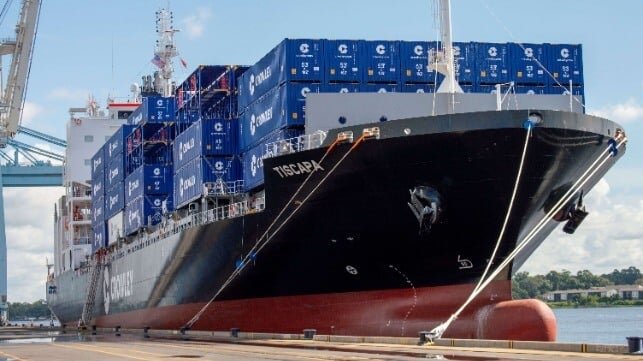[By: Crowley]
Crowley’s newest, LNG-powered containership Tiscapa began its inaugural service today, offering faster and more efficient ocean cargo transport options across the U.S., Caribbean, and Central America.
The Tiscapa, part of the Avance Class of ships, boasts a container capacity of 1,400 TEUs, including 300 refrigerated units. Designed for swift and reliable cargo delivery, this vessel utilizes lower emission liquefied natural gas (LNG) as fuel.
Andrew Davis, vice president of operations for Crowley Logistics, expressed, “The addition of Tiscapa to our fleet signifies Crowley’s dedication to providing efficient logistics solutions in the region. With its LNG-powered technology and increased capacity for both dry and refrigerated goods, Tiscapa strengthens our ability to offer prompt and dependable service to customers moving essential goods throughout the U.S. and Caribbean Basin.”
Embarking on its first commercial voyage from the Port of Jacksonville, Florida, Tiscapa will initially serve the Caribbean Basin before expanding its regular routes to the U.S., Dominican Republic, and Central America. This strategic move aims to enhance direct market connections for various goods, including medical devices, household items, food, and perishables.
Joining sister ships Quetzal and Copán, Tiscapa is uniquely tailored to cater to El Salvador, Guatemala, Honduras, and Nicaragua, facilitating trade growth between the U.S. and Central America.
The Avance Class ships, chartered from Eastern Pacific Shipping, are named to honor the rich cultural heritage of Central America, where Crowley has been a prominent player in shipping and logistics for over six decades. Tiscapa, situated in Managua, Nicaragua, is a historic lagoon surrounded by pre-Columbian artifacts and a towering Augusto Sandino statue, symbolizing the city.
The upcoming addition to the fleet, Torogoz, named after the national bird of El Salvador, is set to commence service in August, completing the Avance Class lineup.
The products and services mentioned in this article are not endorsed by The Maritime Executive.

